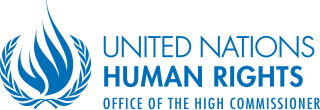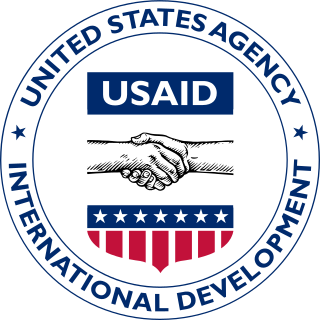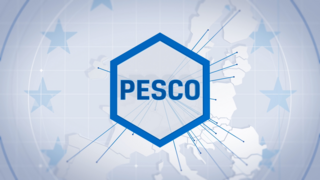
The Office of the United Nations High Commissioner for Human Rights (OHCHR) is a department of the United Nations Secretariat that works to promote and protect human rights that are guaranteed under international law and stipulated in the Universal Declaration of Human Rights of 1948. The office was established by the United Nations General Assembly on 20 December 1993 in the wake of the 1993 World Conference on Human Rights.

The United Nations Industrial Development Organization (UNIDO) is a specialized agency of the United Nations that assists countries in economic and industrial development. It is headquartered at the UN Office in Vienna, Austria, with a permanent presence in over 60 countries. As of April 2019, UNIDO comprises 170 member states, which together set the organization's policies, programs, and principles through the biannual General Conference.

UN Trade and Development (UNCTAD) is an intergovernmental organization within the United Nations Secretariat that promotes the interests of developing countries in world trade. It was established in 1964 by the United Nations General Assembly (UNGA) as the United Nations Conference on Trade and Development but rebranded to its current name on the occasion of its 60th anniversary in 2024. It reports to both the General Assembly and the United Nations Economic and Social Council (ECOSOC). UNCTAD is composed of 195 member states and works with non-governmental organizations worldwide; its permanent secretariat is at UNOG in Geneva, Switzerland.
The United Nations Development Programme (UNDP) is a United Nations agency tasked with helping countries eliminate poverty and achieve sustainable economic growth and human development. The UNDP emphasizes on developing local capacity towards long-term self-sufficiency and prosperity.

The United States Agency for International Development (USAID) is an independent agency of the United States government that is primarily responsible for administering civilian foreign aid and development assistance. With a budget of over $50 billion, USAID is one of the largest official aid agencies in the world and accounts for more than half of all U.S. foreign assistance—the highest in the world in absolute dollar terms.

The United Nations System consists of the United Nations' six principal bodies, the Specialized Agencies and related organizations. The UN System includes subsidiary bodies such as the separately administered funds and programmes, research and training institutes, and other subsidiary entities. Some of these organizations predate the founding of the United Nations in 1945 and were inherited after the dissolution of the League of Nations.
The basic needs approach is one of the major approaches to the measurement of absolute poverty in developing countries globally. It works to define the absolute minimum resources necessary for long-term physical well-being, usually in terms of consumption goods. The poverty line is then defined as the amount of income required to satisfy the needs of the people. The "basic needs" approach was introduced by the International Labour Organization's World Employment Conference in 1976. "Perhaps the high point of the WEP was the World Employment Conference of 1976, which proposed the satisfaction of basic human needs as the overriding objective of national and international development policy. The basic needs approach to development was endorsed by governments and workers' and employers' organizations from all over the world. It influenced the programmes and policies of major multilateral and bilateral development agencies, and was the precursor to the human development approach."

In international relations, aid is – from the perspective of governments – a voluntary transfer of resources from one country to another. The type of aid given may be classified according to various factors, including its intended purpose, the terms or conditions under which it is given, its source, and its level of urgency. For example, aid may be classified based on urgency into emergency aid and development aid.
European Union (EU) concepts, acronyms, and jargon are a terminology set that has developed as a form of shorthand, to quickly express a (formal) EU process, an (informal) institutional working practice, or an EU body, function or decision, and which is commonly understood among EU officials or external people who regularly deal with EU institutions.
The OPEC Fund for International Development is an intergovernmental development finance institution established in 1976 by the member states of the Organization of the Petroleum Exporting Countries (OPEC). The OPEC Fund was conceived at the Conference of the Sovereigns and Heads of State of OPEC Member Countries, which was held in Algiers, Algeria, in March 1975. A Solemn Declaration of the Conference "reaffirmed the natural solidarity which unites OPEC countries with other developing countries in their struggle to overcome underdevelopment", and called for measures to strengthen cooperation between these countries.
Environmental governance (EG) consists of a system of laws, norms, rules, policies and practices that dictate how the board members of an environment related regulatory body should manage and oversee the affairs of any environment related regulatory body which is responsible for ensuring sustainability (sustainable development) and manage all human activities—political, social and economic. Environmental governance includes government, business and civil society, and emphasizes whole system management. To capture this diverse range of elements, environmental governance often employs alternative systems of governance, for example watershed-based management. Obviously, in fact the EG arrangements are very diversed and not at all as inclusive as we could wish them to be.

The space policy of the United States includes both the making of space policy through the legislative process, and the implementation of that policy in the United States' civilian and military space programs through regulatory agencies. The early history of United States space policy is linked to the US–Soviet Space Race of the 1960s, which gave way to the Space Shuttle program. At the moment, the US space policy is aimed at the exploration of the Moon and the subsequent colonization of Mars.

The Organisation for Economic Co-operation and Development is an intergovernmental organization with 38 member countries, founded in 1961 to stimulate economic progress and world trade. It is a forum whose member countries describe themselves as committed to democracy and the market economy, providing a platform to compare policy experiences, seek answers to common problems, identify good practices, and coordinate domestic and international policies of its members.

The Permanent Structured Cooperation (PESCO) is the part of the European Union's (EU) security and defence policy (CSDP) in which 26 of the 27 national armed forces pursue structural integration. Based on Article 42(6) and Protocol 10 of the Treaty on European Union, introduced by the Treaty of Lisbon in 2009, PESCO was first initiated in 2017. The initial integration within the PESCO format is a number of projects which launched in 2018.

Nuclear Non-Proliferation Act of 1978, 22 U.S.C. § 3201, is a United States federal law declaring that nuclear explosive devices pose a perilous threat to the security interests of the United States. The law restricts U.S. export of civil nuclear programs to other nations.

The Millennium Development Goals Achievement Fund (MDG-F) was an international cooperation mechanism committed to eradicating poverty and inequality and to accelerating progress towards the Millennium Development Goals (MDGs) worldwide. Its aim was to improve livelihoods and to influence public policy, which made it responsive to the needs of the poorest populations.
United Nations General Assembly Resolution 30/3520 (XXX.) was a resolution adopted by the UN General Assembly on 15 December 1975. The resolution adopted the World Plan of Action and related resolutions from the International Women's Year World Conference on Women which was held in Mexico City earlier in the year.

Armenia was admitted into the United Nations on 2 March 1992, following its independence from the Soviet Union. In December 1992, the UN opened its first office in Yerevan. Since then, Armenia has signed and ratified several international treaties. There are 20 specialized agencies, programs, and funds operating in the country under the supervision of the UN Resident Coordinator. Armenia strengthened its relations with the UN by cooperating with various UN agencies and bodies such as the International Monetary Fund, the World Bank, the World Food Programme, and with the financial institutions of the UN. Armenia is a candidate to preside as a non-permanent member of the UN Security Council in 2031.
The European Union's scientific collaboration beyond the bloc describes the European Union's frameworks for bilateral cooperation and specific projects in science and technology, with countries and regional blocs situated beyond the European Union.














